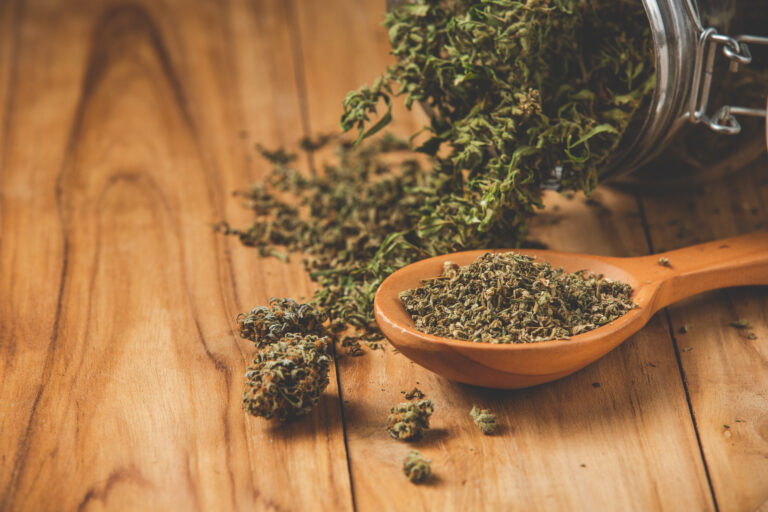In recent years, CBD produktai have become one of the fastest-growing wellness trends both worldwide and in Lithuania. More and more people are discovering this natural compound of the hemp plant and using it for various purposes – from relaxation and stress relief to CBD oil for pain relief or improving sleep quality. While scientific research is still ongoing, many users claim that CBD helps them feel better without resorting to strong medications or synthetic supplements.
On the market, you will encounter different types of CBD Aliejus – full-spectrum ir broad-spectrum. Both have their own benefits and differences, which can determine whether the product you choose will be effective and suitable for you. That’s why it is very important to understand how these types differ and which one best meets your needs.
What is Full-Spectrum CBD?
Composition and Function
Full-spectrum CBD oil preserves the widest range of natural compounds from the hemp plant. In addition to CBD itself, it contains other cannabinoids such as CBG, CBC, and even minimal traces of THC, as well as terpenes and flavonoids that give the oil its specific aroma and added properties. Unlike CBD isolate, this type of oil works synergistically – all compounds interact with one another, enhancing each other’s effects. This phenomenon is called the “entourage effect”, meaning that when taken together, the compounds may produce deeper and more comprehensive benefits than CBD alone.
In Lithuania, full-spectrum CBD products are becoming increasingly popular because they are considered the closest to the plant’s natural composition. For instance, CannuLab Full Spectrum CBD oil (10% or 20%) offers a balanced cannabinoid profile and is often chosen by people looking not only for relaxation but also for improved overall well-being.
Key Benefits
One of the greatest advantages of full-spectrum CBD is its potentially stronger effect. Since cannabinoids, terpenes, and other compounds work in synergy, users often notice more pronounced results compared to using isolated or even broad-spectrum CBD. This is why people who choose CBD oil for pain relief often lean toward full-spectrum products. Moreover, this type is considered the most natural since it retains the widest possible profile of hemp plant compounds.
Possible Drawbacks
That said, full-spectrum CBD does have certain drawbacks. The main concern is traces of THC. Although the European Union allows products to contain up to 0.2% THC, some users may worry about safety or legal uncertainties. It’s important to note that this amount is too low to produce psychoactive effects, but for highly sensitive individuals or athletes subject to anti-doping rules, it may be a concern.
In Lithuania and across Europe, the legal framework is clear – CBD produktai are permitted as long as THC content does not exceed the legal threshold. This is why trusted brands like CannuLab test their oils in independent laboratories to ensure THC levels comply with regulations and the product is safe for everyday use.
What is Broad-Spectrum CBD?
Composition and Function
Broad-spectrum CBD is carefully processed to remove THC while preserving other valuable hemp compounds such as CBD, CBG, CBC, terpenes, and flavonoids. The production usually involves additional filtration or distillation steps that eliminate THC almost entirely. This creates a product that retains most of the beneficial plant properties without any psychoactive component.
The difference between broad-spectrum and full-spectrum is clear – broad-spectrum ensures that the user receives no THC at all, yet still benefits from the synergy of other cannabinoids and terpenes. While the entourage effect may be slightly weaker than with full-spectrum, broad-spectrum remains a strong choice for those seeking a safe and balanced CBD oil.
For example, CannuLab Broad Spectrum CBD oil 10% contains no THC but is rich in other cannabinoids, making it a popular choice among people who value the benefits of hemp but want to avoid even trace amounts of THC.
Key Benefits
The biggest advantage of broad-spectrum CBD is that it suits those who want to avoid THC completely while still benefiting from other cannabinoids. This makes it especially popular among athletes and professionals for whom product purity and safety in anti-doping tests are crucial. It is also a great option for drivers or workers who cannot risk having any THC in their system.
Another important benefit is peace of mind: since there is no THC, users feel safe knowing there’s no risk of psychoactive effects.
Possible Drawbacks
The main drawback is that broad-spectrum may be slightly less potent than full-spectrum for some individuals, due to the absence of THC. Although other cannabinoids still work together, the entourage effect is not as complete as with full-spectrum CBD.
Additionally, not all broad-spectrum products are of equal quality. Some manufacturers may fail to properly remove THC, or conversely, may strip away too many beneficial compounds during processing. This is why it’s essential to choose reliable brands like CannuLab, which provide independent lab results to guarantee their oils are both safe and effective.
Full-Spectrum vs. Broad-Spectrum CBD: Key Differences
Full-spectrum CBD preserves the full chemical profile of the hemp plant, including trace amounts of THC (≤0.2%). Broad-spectrum CBD, by contrast, eliminates THC entirely but retains other valuable compounds.
Effect on the Body
Full-spectrum CBD is often considered stronger, as even minimal THC combined with other compounds enhances the entourage effect, potentially offering more noticeable relief for pain, stress, or sleep issues.
Broad-spectrum CBD, on the other hand, provides a balanced effect without any risk of psychoactive reactions. This makes it ideal for those who want the benefits of hemp but need to avoid THC completely – for example, athletes or drivers.
Legal and Safety Aspects
In Europe, including Lithuania, CBD products are legal as long as THC content does not exceed 0.2%. Both full-spectrum and broad-spectrum oils are lawful if they meet these requirements. However, broad-spectrum eliminates any legal or workplace concerns tied to THC.
As for CBD side effects and safety, both types may cause mild symptoms such as dry mouth, drowsiness, or interactions with certain medications (especially blood thinners or sedatives). These are not considered dangerous, but consulting a doctor is always advised if you plan to use CBD regularly alongside medication.
Which CBD Product Should You Choose?
When choosing between full-spectrum and broad-spectrum CBD, it’s essential to consider your personal goals and situation.
If your main goal is pain relief, full-spectrum CBD is often recommended. Thanks to the synergy of cannabinoids and terpenes, this type of oil may be more effective against chronic pain or inflammation. For example, CannuLab Full Spectrum 20% CBD oil is a popular choice for users seeking deeper relief and improved daily comfort.
If you’re looking for relaxation, stress reduction, or everyday balance, broad-spectrum CBD is a great option. With no THC, it offers peace of mind for those who want the benefits of hemp without any psychoactive risk. The CannuLab Broad Spectrum 10% CBD oil is a balanced solution for daily use, helping to promote calmness and focus.
For people sensitive to THC, broad-spectrum is a safer alternative. Similarly, athletes, professionals, and drivers often prefer broad-spectrum to avoid even minimal traces of THC.
Meanwhile, those with health conditions or who take medications (such as for high blood pressure, depression, or blood thinning) should consult a doctor before starting CBD. Although both types are considered safe, drug interactions may alter the effectiveness of treatment.
Conclusion
When it comes to full-spectrum vs. broad-spectrum CBD, there is no single correct answer. Both have unique advantages and drawbacks, and the best choice depends on your personal needs, lifestyle, and goals. Those seeking stronger effects and a natural composition often prefer full-spectrum, while those who want complete peace of mind regarding THC turn to broad-spectrum.
It’s important to remember that everyone’s body reacts differently to CBD. Choosing trusted brands that provide independent lab test results ensures safety and quality. While both full-spectrum and broad-spectrum are safe for most users, mild side effects such as dry mouth, drowsiness, or interactions with medications may occur. Consulting a healthcare professional is recommended, especially if you have underlying conditions or take prescription drugs.
By making an informed and responsible choice, CBD can become a natural and beneficial part of your everyday routine.
👉 Ready to find the right product for you? Visit CannuLab and choose high-quality, lab-tested CBD Aliejus tailored to your needs.



